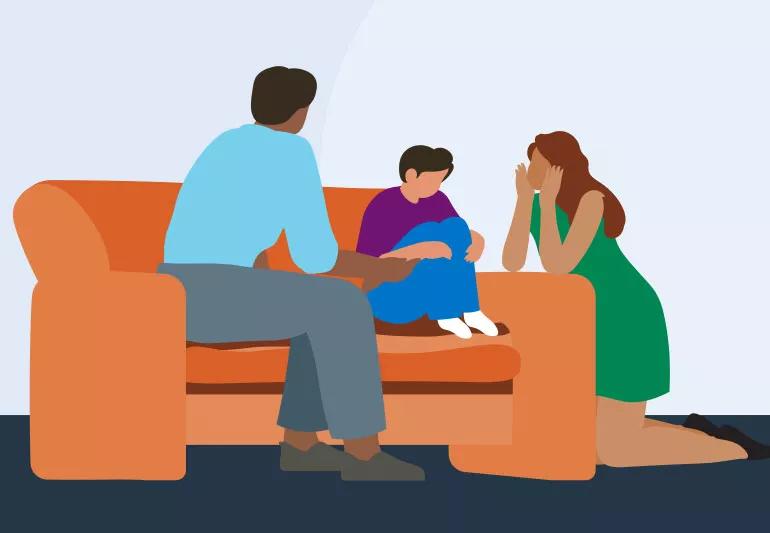It’s important to share the news in an honest and age-appropriate way

There’s no easy way to tell anyone that you have cancer — but especially not your kids. Breaking the news can be an emotional roller coaster, and there are no absolute right or wrong ways to do it. Like so much of life and parenting, you just do the best you can.
Cleveland Clinic is a non-profit academic medical center. Advertising on our site helps support our mission. We do not endorse non-Cleveland Clinic products or services. Policy
“Cancer is scary, and it’s scary to talk about bad things, especially when there are so many unknowns about it,” recognizes child psychologist Kate Eshleman, PsyD. “As an adult, you don’t always know what you’re dealing with, which can make it more difficult to speak to children about it.”
Dr. Eshleman shares some strategies that can help you explain this tough topic — and keep the lines of communication open.
First, it’s important to give yourself some time between learning the news yourself and sharing it with your kids. Allow yourself to process the news and get a handle on it before talking to your children.
Other things to consider:
There’s no definitively correct way to tell your children that you have cancer, but try to trust yourself. You know your kids best and what they can handle, so let your instincts be your main guide.
So, where should you begin?
“In general, it’s always important to give information truthfully and in a developmentally appropriate way,” Dr. Eshleman says.
Dr. Eshleman delves deeper into each of these tips for talking to your kids about cancer.
This might seem like an unexpected first step, but before you break the news about your cancer, ask kids what they know about cancer, in general — even if you expect them not to know anything about it.
“As adults, a lot of times, we under-assume what children are aware of,” Dr. Eshleman says, “but kids often know more than we expect.”
She suggests asking them what they know about cancer, which can help provide a starting point for the conversation and clues you in to any understanding and misconceptions they may have.
When you’re talking to your kids about anything, but especially something as weighty as a cancer diagnosis, one of your main goals should be to maintain their trust.
“In order to do that, you have to be able to tell them the truth,” Dr. Eshleman states. “Kids are smarter and pick up on more than we sometimes assume.”
No matter their age, kids can sense when something’s wrong and when you’re not telling them the truth, which can make their fears worse. So, when you tell your children that you have cancer, it’s important to be honest and direct — even when you wish you could shield them from the truth.
Children of different ages react differently to the news of a cancer diagnosis. And being honest with them doesn’t necessarily mean giving them every single painful detail.
“When you’re communicating with your kids, it’s important to be mindful of the language you use,” Dr. Eshleman encourages.
Age isn’t the only important factor in how you have this important discussion. Their temperament and general personality play a role, too.
“Some kids will want a lot of information, while other kids will be very uncomfortable and just need to know the basics,” Dr. Eshleman says. “Think about who your child is and how they typically cope best, then use that information to frame your conversation.”
Different kids, of course, have very different personalities — and very different coping skills. You may need to have separate conversations with your kids, each targeted to individual needs and levels of understanding.
As you share the news, begin to discuss the changes to come.
“Start telling them what they can expect and what plans are in place for coping with that,” Dr. Eshleman advises. “Explain, for example, that Mommy is going to lose her hair, then problem-solve around that: She will start wearing a wig, or We’re going to go buy some new hats.”
Talk, too, about some of the ways your cancer may impact their life. Kids thrive on routine, and nothing upends everyday routines like cancer can.
“It’s possible that each and every aspect of a child’s day-to-day life could shift,” Dr. Eshleman says. “Explain that there will be appointments that might affect them — that sometimes, Grandma will pick them up from school instead of Daddy, or that they might spend the night with their cousins more often.”
Not all kids will have questions, at least not right away. But depending on your child’s personality and coping style, they may want to know more about your illness and what comes next.
“By answering their questions, you make them feel safe and comfortable to continue asking questions,” Dr. Eshleman explains. “This helps maintain open lines of communication.”
Common questions include:
If your child asks questions that you don’t have the answer to, it’s OK to say so.
“You don’t have to have all the answers at the start of the conversation,” Dr. Eshleman says. “You can say that you’ll talk to your doctor and find out for both of you.”
Guide the conversation as much as you can. When you present the news in a calm, reassuring voice, you show your children that you’re coping — which helps them do the same.
“What impacts you is going to impact your child,” Dr. Eshleman says. Try to be mindful of your own reactions to this new diagnosis and the stress it’s putting on you. You’re there to inform and support your children, so you want to do your best to stay in control.
Staying in control doesn’t mean that you have to suppress all of your feelings. Dr. Eshleman encourages you to be yourself — and that may mean showing your emotions.
“Show expressions of emotion and modeling how to cope with those emotions gives children permission and space to do the same,” she continues. “It tells them it’s OK to be angry, sad or worried, and it opens up conversations about how to deal with that.”
Sharing your own feelings can reinforce that you’re all in this together. Plus, Dr. Eshleman says that trying to hide your emotions will only make you feel — and appear — more stressed, which can make the conversation more difficult.
You’ve had the initial conversation. Now what? Dr. Eshleman shares additional tips about how to be there for your child afterward and in an ongoing way.
Kids might have a hard time processing or understanding the news the first time they hear it. They may also need to ask the same questions over and over again.
“Think of your first conversation as one in a series,” Dr. Eshleman recommends. “Learning together as you go creates continued space for discussion.
On the other hand, don’t force conversations that your child doesn’t seem to want to have.
“It’s important to remember that each person, children and adults included, copes differently,” she adds. “Some people benefit from talking, but not everyone wants that. Look for other opportunities to promote that act of coping that don’t involve conversation.”
During your first conversation with your child, you set expectations about possible changes in their routine. But when their routines are actually about to change, be sure to discuss the details so kids know what to expect in real-time.
Explicitly explain, for example, “Starting next week, you’re going to take the bus home after school,” or “You and your sister are going to go to the neighbors’ house for a playdate tomorrow so your dad and I can go to his doctor’s appointment.”
Try to maintain kids’ routines as much as possible, but also help your child develop flexibility and coping skills by communicating on an ongoing basis.
Kids don’t know what’s happening when you’re at appointments or in the hospital. All they know is that you’re not there to pick them up from school or tuck them into bed.
“Helping them understand what’s going on during these periods of time can make it feel less mysterious to them,” Dr. Eshleman says.
With your provider’s permission, she suggests considering sharing photos of clinic visits or doing a video chat from the waiting room. It may also be appropriate for your child to visit you in the hospital or be involved in other aspects of your treatment.
“This helps them to better understand what’s going on when you’re not home,” Dr. Eshleman says.
Just like adults, children need breaks from stress and other painful emotions. Play can be a wonderful opportunity for this type of pause.
It can also be a chance to better understand how they’re coping. Many children express and work through their feelings while playing, which means that oftentimes, their play can reveal their fears or misconceptions about what’s going on.
It’s important for caregivers to watch and listen for issues or feelings that appear during play so you can help address them.
Your family doesn’t have to go through this experience alone. Other adults who play important roles in your children’s lives can also help them cope.
“Oftentimes, parents feel like this is a private issue that the family needs to address independently,” Dr. Eshleman understands, “but there are a lot of people who can help support your child through this experience.”
She recommends communicating with teachers and other school personnel, like coaches or tutors. “When they know what’s going on, they can keep an eye on how your child is coping and continue to support them.”
Consider sharing the news with the parents of your child’s friends, too. They may be willing to add your child to their afterschool pickup route, squeeze in an extra playdate or host an occasional sleepover to help give you time to manage your illness and treatment.
“There’s no handbook for how to communicate with your kids in this type of unknown situation,” Dr. Eshleman stresses, “so try to reduce the pressure to do it perfectly.”
You’re going through something big and scary. It’s understandable that you don’t know exactly how to talk to your kids about it. But give yourself — and them — some credit.
“Children tend to be very resilient, especially if we can support their coping along the way,” she encourages. “They may do much better with it than you think.”
Learn more about our editorial process.

Working has its benefits, but it may require some modifications — and that’s OK

Studies show the high health cost of spending hours in a chair

If menopause symptoms disrupt your life, HRT can help, with minimal cancer risk

Research shows some associations and concerns, but no definitive connections

Research doesn’t show a link between the personal hygiene product and breast cancer

When nutritious foods are hard to come by, your health can suffer

It’s important to watch for and guard against conditions like heart disease and cancer

Throat and ear pain that lasts more than four weeks deserves serious attention

Your metabolism may torch 1,300 to 2,000 calories daily with no activity

A gentle touch in all the right places may help drain your sinuses